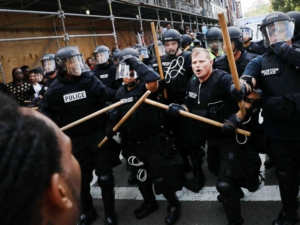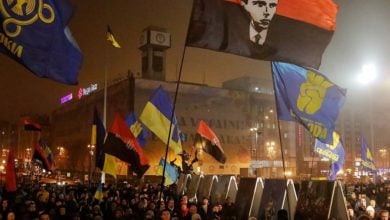
On Aug. 19 I was in the Boston area during the massive counterprotest that completely overwhelmed the fascist, white supremacist “free speech rally—but was unable to attend. Instead I had the dubious privilege of being able to watch the non-stop live coverage of the action on MSNBC as I visited with my frail elderly mother.
Together my mother and I were inspired by the images of the massive crowds of anti-fascist protesters that were shown on TV, with dramatic aerial shots as well as “Johnny on the spot” interviews with individual counterprotesters, all of whom seemed to be extremely thoughtful and well-spoken. I could barely contain my joy as the anchorperson announced that the fascists had ended their rally early and were being escorted out of the Boston Commons.
Then we began to see footage of a massive police mobilization. Hundreds of cops in full riot gear were advancing in formation on crowds of unarmed people, wielding giant batons. I saw live footage of the police as they grabbed an individual and pushed that person behind police lines. I saw a man in shorts and a tank top standing in front of the helmet-wearing police, his hands in the air. He appeared to be shouting at them. He stepped away, then turned back and they grabbed him too.
The MSNBC commentator was giving a running description of the police and their behavior, praising their “flawless execution” of “crowd control” tactics. The commentators’ and announcers’ narrative began to focus on contrasting the counterprotesters who were marching “peacefully” and those who were being pushed and arrested by the police.
Later in the afternoon, NSNBC invited on an expert on anti-fascist organizations. Asked about the violent police interactions with the anti-fascist marchers, this expert stated quite clearly that in his experience researching antifascist groups, often it was the police that provoked the violence with aggressive tactics. As he said this, MSNBC showed another reel of what I call protest porn: footage of cops with batons raised against unarmed protesters. The announcer quickly shut down the expert and turned to another guest.
The Boston Globe showed multiple photos of the day’s actions. Despite the presence of up to 40,000 people, only 33 of whom ended up being arrested, the photos published overwhelmingly focused on violent images of police and anti-fascist protesters.
As the Commons and downtown started to clear out of the tens of thousands of people who had answered the call to stand against fascism, Boston Police Commissioner Marty Evans held a press conference. In it he praised his officers for “executing” their crowd control tactics so well. Apparently the cops had had a plan to only allow the people out of the area in one way. He praised those counterdemonstrators who he said had come out for “the right reasons” to oppose racism and bigotry. On the other hand he singled out for condemnation those who he said had come for the wrong reasons, to “cause trouble.”
The sight of this top cop smugly judging protesters and determining who was marching for the right or wrong reason made me furious. He spoke as if the Boston Police Department were not itself an institution of racism and bigotry. As if the BPD had never killed an unarmed Black youth like Terrence Coleman. As if it had never in its history attempted to stop an anti-racist mass march, as the department did in 1974 at a march my mother and I had participated in together.
Why did the police have to force everyone to leave the Commons only through one path? What exactly was the point? It certainly looked from the live footage that large groups of people were simply trying to leave the area and were faced with huge lines of helmeted storm troopers. Why were the police there at all? They acted to protect the handful of fascists and get them out of the area safely, while arresting and using violence against anti-fascists.
Meanwhile, after a week in which almost every public voice of both Democrats and Republicans had been raised to uphold the moral distinction between fascists and white supremacists on the one hand, and anti-fascist protesters on the other, MSNBC, the tribune of liberalism, had figured out a way to make a new moral equivalency, between “some but not all” antifascist counterprotesters (the “bad” protesters) and fascists, while upholding the virtues of the “good” protesters.
The literally tens of thousands of people who participated in the Aug. 19 protests against fascism and white supremacy in Boston were there—live. Each one saw the event through a singular, personal lens. The media have the advantage of literally having multiple lenses on the action, from the helicopter cameras to the reporters on the streets and in the crowds. This is not to say that these media lenses tell a story that is more “true” than the story told by a participant; it’s just a few more lenses—but the media also tell us what these images are supposed to mean.
According to MSNBC, police pushing crowds of unarmed anti-racists with batons is necessary for public safety—not an example of police brutality!
It’s really great that tens of thousands of people came out in Boston to stand in solidarity against fascism and white supremacy—and it was absolutely necessary. That said, as PSL Boston wrote, “Many organizations at the demonstration sought to link the struggle against open, blatant white supremacy to struggles against the white supremacy ingrained in the daily experience of millions across the country.”
To uproot this daily, ingrained white supremacy will take ongoing, revolutionary organizing for deep social change. As Tahia from Mass Action Against Police Brutality said to the crowd, “If you came out and this is all you can do; thank you. I want to push you a little further and say this is the beginning of what you can do. The only way they win is if we don’t fight.”






